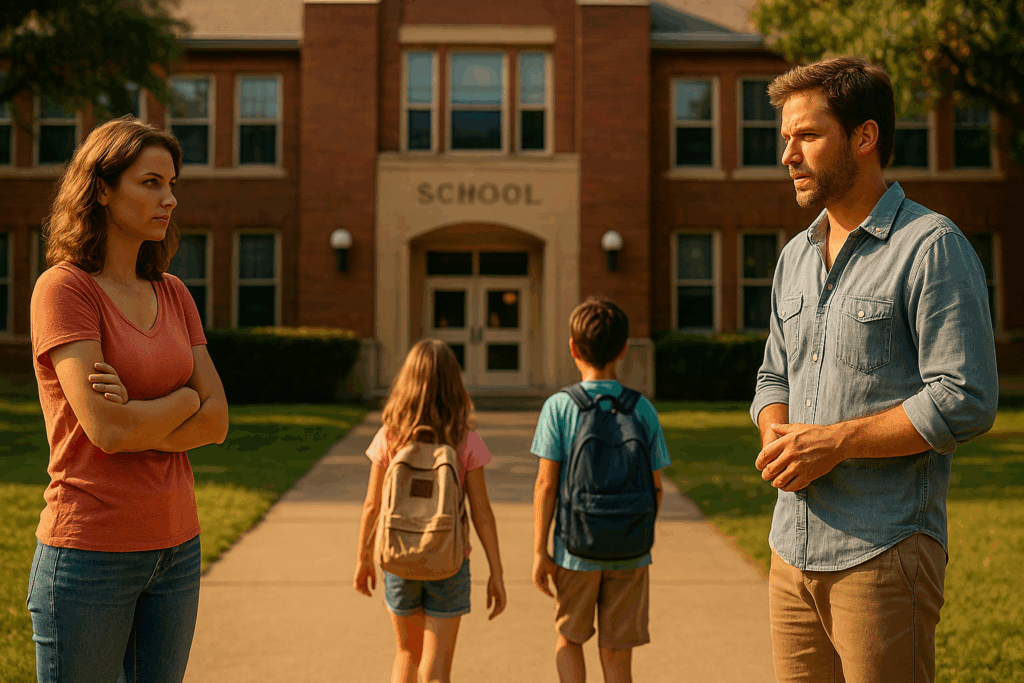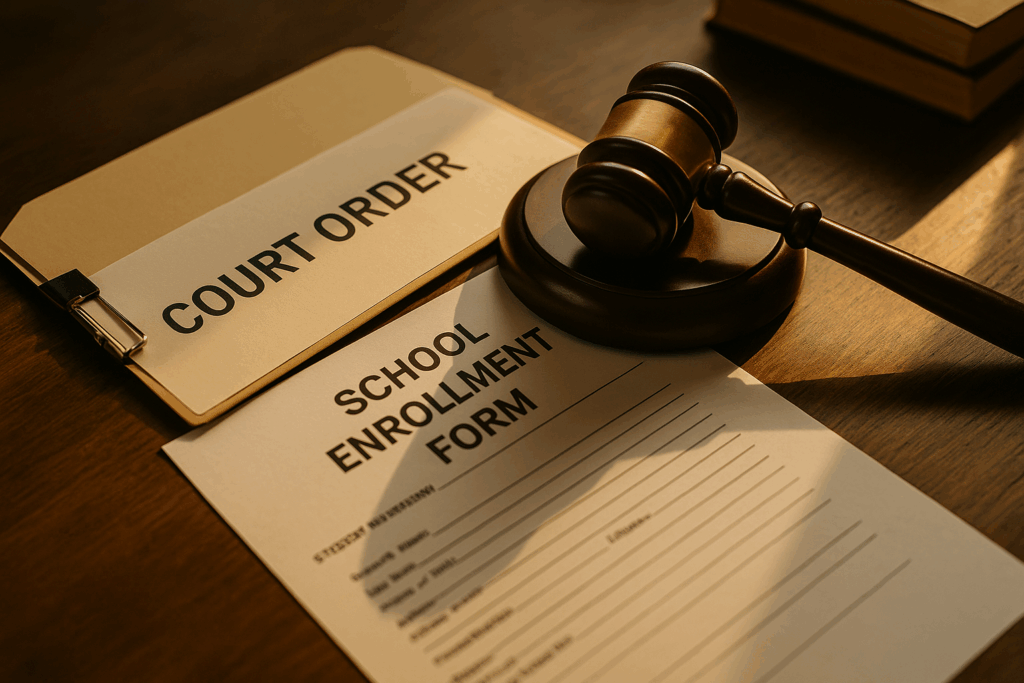
Ever tried picking a school lunch that makes both your kids happy? Now imagine choosing an entire school—and trying to do it with your ex. If that gave you a slight shiver, you’re not alone. School choice becomes one of the most emotionally loaded and legally complex decisions for divorced or separated parents. And yes, the big question often starts with this: who chooses where a child goes to school in Texas?
Short answer? It depends—on custody orders, parenting plans, legal rights, and sometimes… which parent lives closer to the better-rated school. But here’s the kicker: the school your child attends doesn’t just affect pickup lines and backpack styles—it can shape their academic performance, their friendships, and even how secure they feel post-divorce.
In this blog, we’re breaking it all down—Texas-style. You’ll learn what the law says (and what it really means), how courts think about school zoning and academic stability, what to do when you and your ex don’t agree, and how we’ve helped real families navigate the back-to-school custody maze with less stress and more confidence.
Whether you’re in the middle of a custody case, thinking about modifying one, or just trying to avoid a showdown over school enrollment, we’ve got practical, parent-focused tips and the kind of legal insight most people only learn the hard way. Stick with us—we’ll help you protect your child’s education and your peace of mind.
Key Takeaways
- Parents in Texas have significant decision-making rights regarding their children’s education, requiring mutual consent for changes unless specified by court orders.
- Joint managing conservatorship allows both parents to participate in school choices, while exclusive rights enable one parent to make unilateral decisions about school enrollment.
- Legal access to school records and ongoing communication with educators are crucial for parents to support their child’s academic progress and address any concerns promptly.

Secure Your Child’s Future—Start Today
Don’t face custody challenges alone. Schedule your consultation now with a trusted Texas family law attorney and gain the clarity, support, and legal protection your family deserves.
Parental Rights in Educational Decisions
In Texas, the question of who chooses where a child goes to school in Texas depends heavily on the type of conservatorship outlined in the custody order. Under the Texas Family Code §153.134, when both parents are appointed joint managing conservators, they usually share the right to make educational decisions. This means that significant changes—like switching school districts, enrolling in private or charter schools, or beginning homeschooling—require both parents to agree unless one parent has been given exclusive authority. Courts may assign that exclusive right when cooperation is impossible or when one parent poses a risk to the child’s well-being, as clarified in recent updates to Texas Family Code §153.004.
As our family law team often explains, joint decision-making encourages active co-parent involvement and helps maintain consistency for children during emotionally challenging transitions. Parents are also legally entitled to request special education services, participate in ARD (Admission, Review, and Dismissal) meetings, and advocate for accommodations based on their child’s specific learning needs. Open communication with school officials can reduce conflict, especially when both parents work together to stay informed and involved in the child’s academic progress.
When parents consider homeschooling, it must be addressed in the custody order and comply with state educational standards. Our attorneys frequently help families include homeschooling provisions in their parenting plans to avoid future disagreements.If you’re navigating a school-related dispute during a divorce or custody suit, it’s essential to understand your legal rights early on—especially when preparing for a courtroom setting. Our blog on preparing for your Texas custody suit offers helpful strategies.
We’ve also created a resource on parenting time and educational choices to support families who are planning for the school year during or after divorce. Educational decisions are more than logistical—they directly impact your child’s academic performance and emotional well-being. At The Law Office of Bryan Fagan, PLLC, we’re committed to helping families protect their future through clear legal guidance, compassionate representation, and solutions tailored to your child’s needs.

Joint Managing Conservatorship and School Choice
When it comes to who chooses where a child goes to school in Texas, the answer often hinges on whether the parents share joint managing conservatorship or if one parent holds exclusive rights. Under Texas Family Code §153.133, joint managing conservators typically share the authority to make major decisions regarding their child’s education, including selecting a school. If disagreements arise, mediation can be a powerful tool to resolve conflict while preserving the child’s educational stability—a priority emphasized in the most recent updates to Texas custody law.
As our attorneys frequently advise, joint conservators without designated exclusive rights must cooperate, or the school decision may default to what’s reasonable within the geographic restrictions established in the court order. When one parent is granted the exclusive right to make educational decisions under Texas Family Code §153.132, they may independently determine the child’s school without the other parent’s consent. However, this decision must still reflect the child’s best interests—something courts take seriously when reviewing proposed changes to school enrollment.
Parents facing this issue should also understand the concept of continuing jurisdiction, especially when educational disagreements span multiple counties or states. We’ve explained this further in our blog, Understanding Texas Custody & Exclusive Continuing Jurisdiction, which provides clarity on how courts determine authority in cross-jurisdictional cases. These nuances often catch parents off guard, making it all the more important to review your current orders and consult with a legal professional when disputes emerge.
To explore more about how school decisions fit into larger custody matters, our guide on how joint custody works in Texas offers additional insights. As we’ve seen in our work with Texas families, creating a parenting plan that defines each parent’s rights and obligations can prevent confusion and reduce stress—ensuring your child’s education remains a stable, forward-moving part of their life.

Exclusive Right to Determine School Enrollment
When granted exclusive rights to determine school enrollment, one parent can make unilateral decisions about the child’s school, distinct from determining primary residence, often specified in custody agreements to prevent ambiguity. These exclusive rights can significantly influence the child’s educational path and the other parent’s involvement.
Texas courts carefully assess a parent’s educational involvement history before granting exclusive rights. The parent with exclusive rights can choose between:
- Public schools
- Private schools
- Charter schools
- Homeschooling, if it benefits the child.
Clear custody agreements on school enroll can prevent disputes and ensure a smooth educational journey for the child.
Court Orders Impacting School Decisions
Court orders play a vital role in resolving disputes over who chooses where a child goes to school in Texas. Under Texas Family Code §153.132, courts can assign the right to make educational decisions either exclusively to one parent or jointly to both, depending on the family’s specific circumstances. This legal designation offers much-needed clarity and can prevent future conflicts about school choice, enrollment, or curriculum decisions—especially during or after a contentious divorce or custody dispute.
According to our family law team, judges take several factors into account when allocating these rights, including each parent’s past involvement in the child’s schooling, their ability to communicate, and their commitment to supporting the child’s educational development. Reviewing your current court orders—particularly any sections outlining conservatorship and rights under §153.134—can help you understand who has the authority to make these decisions. With the latest updates to the Family Code, courts are placing increased emphasis on educational stability and minimizing disruptions to a child’s routine.
When circumstances change—such as a child needing to transfer schools, begin homeschooling, or enroll in a specialized program—parents have the option to seek a modification of their custody order. Our legal professionals have helped many clients understand the process of filing for modifications to reflect evolving educational needs, often involving careful documentation and evidence of the child’s best interests. If you’re navigating a shift in school plans or experiencing co-parenting disagreements, taking proactive legal steps can ensure the child’s academic path remains on course.
Families in Harris County and surrounding areas, including Tomball, often face unique challenges when court orders intersect with changing school districts, work relocations, or blended family dynamics. For additional insight into modifying custody arrangements and school-related provisions, we invite you to explore our article on how to change a custody order in Texas. As we’ve seen in our work with Texas families, clear legal guidance early on can make all the difference in protecting your child’s educational future.

Changing Schools: Legal Requirements and Procedures
Changing a child’s school in Texas requires mutual parental agreement unless a court order states otherwise. This is particularly important during transitions like moving from elementary to middle school. These legal procedures ensure both parents have a say in significant decisions, maintaining a balanced approach to the child’s education.
Parents should consider the social impact of switching schools, as it can disrupt friendships and affect social development. Following legal requirements helps make well-informed decisions that prioritize the child’s well-being.
Access to Child’s School Records
Texas parents have the right to access their child’s school records, including attendance, grades, and disciplinary records, which schools must provide within 45 days of a request. This access allows parents to actively participate in their child’s education and address issues promptly.
A certified copy of court orders may be required to confirm educational rights and facilitate access to school records. When students transfer schools, especially under a court order or due to homelessness, previous school records must be transferred within a specified timeframe to ensure a smooth transition.
These provisions help maintain educational continuity and provide parents with necessary instructions to support their child’s academic journey.
Impact of Divorce on School Choice
Divorce can significantly impact educational decisions and school choice. Texas courts prioritize the child’s best interests when determining which parent has decision-making rights. These decisions impact not only academics but also the child’s social development and emotional stability.
Disagreements over school choices can increase tension and affect the child’s well-being. Parents should periodically revisit custody agreements to ensure they meet the child’s evolving needs, including considerations for child support. This helps parents navigate post-divorce educational decision-making challenges more effectively.
Public vs. Private School Decisions
When parents face the decision of whether to enroll their child in public or private school, the question of who chooses where a child goes to school in Texas becomes especially important. Under Texas Family Code §153.132, the right to make educational decisions—such as selecting a school—may be assigned solely to one parent or shared between both. This legal distinction becomes crucial when parents disagree about the type of school that best fits their child’s academic and emotional needs. Courts aim to uphold the child’s best interest, with the most recent updates to the Family Code reinforcing the importance of educational stability and minimizing disruption during and after custody proceedings.
According to our family law team, public schools in Texas typically require proof of residency and adhere to state-mandated curriculum standards. They offer a broad, community-based experience, often with more accessible extracurricular opportunities. On the other hand, private schools may provide smaller class sizes, individualized instruction, and enhanced college preparation support. Parents who are considering these alternatives must also factor in tuition costs, commuting logistics, and how each option aligns with the parenting plan or custody order in place.
As we’ve seen in our work with Texas families—including those in Sugar Land—deciding between public and private schooling isn’t just a matter of preference. It’s often deeply tied to legal authority outlined in court documents. If one parent holds the exclusive right to determine educational matters, they may be able to choose the school without the other parent’s agreement. However, joint managing conservators must collaborate unless the court has clearly granted one party the deciding power. Reviewing your custody order or seeking a modification under Texas Family Code §156.101 may be necessary if conflicts arise.
Our legal professionals have helped many clients understand how school choice impacts long-term custody dynamics. For more information on building parenting plans that work in real-life situations, visit our article on how to handle school year parenting time in Texas. At The Law Office of Bryan Fagan, PLLC, we are committed to helping parents make informed decisions that reflect their child’s best interests—whether that means advocating for a specialized private education or maintaining continuity in a trusted public school.

Military Families and School Choices
Military families face unique school choice challenges, with around 215,000 military-connected students in Texas public and charter schools. The Military Interstate Children’s Compact Commission facilitates smoother transitions and addresses educational challenges when moving across state lines, especially for those in the armed forces.
Texas schools with the Purple Star Campus designation are recognized for supporting military-connected students and their families. These schools offer resources and programs to help military children adjust to new environments, ensuring their educational needs are met despite frequent relocations.

Homeschooling and Parental Rights
Homeschooling is a legal and flexible educational option in Texas, but it also raises important questions about who chooses where a child goes to school in Texas, particularly in custody situations. According to Texas Family Code §153.132, if one parent is granted the exclusive right to make educational decisions, they may choose homeschooling without needing the other parent’s agreement. However, in joint managing conservatorship arrangements, both parents typically must agree to this educational approach. These distinctions are especially important in light of recent updates to the Family Code, which emphasize maintaining educational stability and promoting the child’s best interest.
As our attorneys frequently advise, Texas law requires that a homeschool program include a legitimate curriculum with written materials covering core subjects such as reading, spelling, math, grammar, and good citizenship. Standardized testing is not required for homeschooled students, offering greater academic flexibility—but that freedom comes with a need for thoughtful planning and, ideally, mutual agreement between co-parents. Whether parents choose homeschooling to better support a child’s learning style or due to concerns with local school options, the legal foundation must be solid and well-documented.
Our legal professionals have helped many clients understand that while Texas law does not require parents to report academic progress in a homeschool setting, transparency often promotes healthier co-parenting relationships. Concerns sometimes arise about whether Child Protective Services (CPS) can intervene based on homeschooling alone, but under Texas law, CPS cannot use homeschooling as grounds to remove a child or terminate parental rights unless other serious issues exist. We’ve addressed similar family law questions, including older teens’ rights under court orders, in our blog on whether 18-year-olds must follow visitation orders.
For more on how homeschooling fits into broader custody and parenting decisions, our guide on modifying custody orders in Texas provides helpful insight. As we’ve seen in our work with Texas families, clearly defining educational responsibilities in your custody agreement—especially when homeschooling is involved—can reduce misunderstandings and protect your child’s learning experience long term.
Extracurricular Activities and School Events
Extracurricular activities and school events are vital for a child’s overall development. Parents are entitled to receive information about their child’s school activities, provided privacy laws are not violated. Managing scheduling conflicts between parenting time and extracurricular activities requires prioritizing the child’s needs and interests.
Typically, the parent with custody at the time is responsible for transportation to and from extracurricular activities. Many parents find that shared decision-making is common in joint child custody arrangements for major extracurricular activities, with the other parent and co-parenting apps assisting in organizing schedules and communication, acting as a guardian in the process to find answers.
These tools ensure the child can participate in activities that interest them at any age, contributing to an essential example of well-rounded education and encouraging participation intended to attend school activities, which is vital for a child’s education and account. When a child attends school activities, it further enhances their learning experience in children’s education and has completed their development. Additionally, having a child in school can significantly impact their overall growth and a child’s life.
Conclusion:
Parenting is never easy—and when school choice gets wrapped up in legal orders, co-parenting dynamics, and district boundaries, it can feel downright overwhelming. But the good news? You don’t have to navigate it alone. Knowing who chooses where a child goes to school in Texas isn’t just about paperwork or policy—it’s about doing what’s best for your child today, tomorrow, and years down the line.
Whether you’re making decisions during a divorce, revisiting a parenting plan, or just trying to keep your child on track academically, having the right legal guidance can make all the difference. At The Law Office of Bryan Fagan, PLLC, we’re here to help you protect your child’s future—and your peace of mind.
So take a breath. Then take the next step. Reach out, ask questions, and let’s talk about how we can support your family’s unique needs. Because at the end of the day, school choice shouldn’t be a battle—it should be a bridge to your child’s success.
And hey, if you’ve ever debated school colors or mascot names with your ex, just know: you’re doing the hard work of showing up. Let us help with the legal part, so you can focus on what matters most—being the parent your child needs.
Texas School Choice: Frequently Asked Questions
What determines where a child goes to school?
A child’s school placement is typically determined by their home address and the school district zoning rules. In Texas, court orders, custody arrangements, or special transfer approvals may also influence where a child goes to school.
Can you choose what school your child goes to in Texas?
Yes, but there are limits. Parents can apply for transfers, magnet programs, or charter schools. However, acceptance often depends on space availability, district policy, and whether the child meets certain qualifications.
At what age in Texas can a child decide who to live with?
In Texas, children 12 years and older can express a preference to the court, but the judge makes the final decision based on the child’s best interest—not solely on the child’s wishes.
Can my child go to a different school district in Texas?
Yes, with an approved transfer. Texas school districts can allow students to enroll from outside their zone, but policies vary, and not all districts accept out-of-district students.
How does 50/50 custody work with school?
In 50/50 custody, parents typically agree on which school the child will attend, usually based on one parent’s address. A court order or parenting plan should clarify who has the final say if disagreements arise.
How do parents choose a school for their child?
Parents often consider location, academic performance, special programs, and extracurricular opportunities. In joint custody situations, both parents must usually agree unless one is granted the exclusive right to make educational decisions.
Can I go to a school I’m not zoned for in Texas?
Sometimes. You may request a transfer, enroll in a charter or magnet school, or use a public school of choice program. Approval depends on district rules and capacity.
How does school choice work in Texas?
Texas school choice allows families to explore options beyond zoned schools, including charter schools, magnet programs, public school transfers, and homeschooling. Availability and eligibility vary by district.
Can my child go to a school they are not zoned for?
Yes, but it requires a transfer request and district approval. Factors such as program availability, class sizes, and school capacity may impact the outcome.
Bryan Joseph Fagan is a respected child custody attorney based in Houston, Texas, with deep roots in Atascocita. As the first lawyer in a close-knit family that includes two adopted brothers, Bryan brings a personal connection to every family law case he handles. His early caregiving experience—supporting his grandmother through Alzheimer’s while attending night school at South Texas College of Law—shaped his unwavering commitment to helping families through life’s toughest transitions.
Now a father of three, Bryan’s real-world parenting perspective enhances his legal insight. He leads one of the most dynamic family law teams in Texas, with a particular focus on child custody, visitation rights, and protecting parental rights. From hotly contested custody battles to amicable co-parenting arrangements, Bryan and his team understand that at the heart of every case is a child who deserves stability, safety, and love.
As a certified member of the College of the State Bar of Texas, Bryan holds himself to the highest standards of legal excellence and continuing education. He is known for crafting innovative, effective legal strategies that reflect both the letter of the law and the emotional realities families face.
Bryan’s practice spans every aspect of Texas family law, including:
Custody and visitation disputes
Modifications and enforcement of existing orders
Complex divorce proceedings involving children
Adoption and paternity cases
Marital property agreements
Defense against false CPS allegations
Bryan is also an active member of the Houston Bar Association’s Family Law Section and participates in statewide legal groups committed to improving outcomes for Texas families. Whether negotiating a peaceful custody agreement or litigating in court to protect a child’s best interests, Bryan Joseph Fagan is a fierce advocate for parents and children across Texas.


